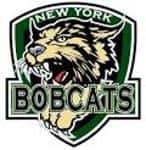Bobcats Housing Program Information
Young, ambitious, aspiring athletes, ranging in age from 16 – 20 will need a stable, secure “home away from home” for the upcoming hockey season. The season will run from August through April. Opening your home to an elite athlete is wonderful experience for the whole family. In addition to a compensation package, many long-lasting relationships are formed as the athlete can serve a positive role model for your young hockey player.
Young, ambitious, aspiring athletes, ranging in age from 16 – 20 will need a stable, secure “home away from home” for the upcoming hockey season. The season will run from August through April. Opening your home to an elite athlete is wonderful experience for the whole family. In addition to a compensation package, many long-lasting relationships are formed as the athlete can serve a positive role model for your young hockey player.
The Bobcats/Royals is a Junior A program geared toward advancing the careers and academics of aspiring hockey players and are affiliated with the Royals and Rebel’s youth programs that are AAA, AA and A level programs with emphasis on further player development with an eye to upper level hockey.
Compensation:
- $400 monthly stipend to help cover the expenses while actively billeting a player
(typically August through March). - A hockey tuition credit per billeted player
- Unique opportunities on and off the ice for Jr. Players and their billet families
What do I have to do to host a player? What can I expect?
- Provide a clean, family atmosphere for the player
- Make sure that the player is well nourished and fed
- Respect the player. Offer advice, be a friend. The experience of leaving home and transitioning into a new home can be difficult. We ask that our billet families help offer guidance and support during this transition period. .
- Communicate! (with your billet and the staff., little problems can become big issues if not discussed early)
- The staff will check on the players regularly, both players’ and billets’ cooperation
is asked for by the organization to ensure a professional and enjoyable relationship has been established.
What should I expect from the player living in my home?
- Respect. It is not a right to live at a billet’s home, it’s a privilege.
- A pleasant, courteous and helpful new family member.
- To follow all rules of the house, the player will take care of their room.
- Your player will stay in their own billet homes each night, unless the billet family and/or staff grants permission.
- Common Courtesy (ex.: make you aware of practice or game changes. not be home for meals, goings and comings)
- Any long distance calls should be made using their player’s personal cell phone.
- Drinking, smoking, tobacco use and drug use is strictly forbidden by the organization
Host Families
Some Bobcats players are housed in our community by ‘host families’. The team’s Housing Supervisor, coordinates placement and manages the program on a day-to-day basis. Most housing families have children currently or formerly involved in youth hockey and enjoy the opportunity to help a Bobcats player while at the same time having a young man around who will serve as a good role model for their own or other children in the community. Players are treated as members of the host parents’ family and quickly become part of the family and of the Long Island community. Living away from home for the first time can be a very rewarding experience for players. Host families and player families both report that participating in the housing program is also rewarding for them as families. Strong friendships are formed between players and families. Many maintain close relationships in the future.
Living away from home is an important part of a player’s social and emotional development. It forces players to be accountable and responsible for their actions and sensitizes them to the needs and experiences of others in their surroundings. As per NCAA rules, a monthly fee is charged to each player. Their payment of their own housing fees protects players’ amateur status. Additionally, the fees help housing families with the added expenses of hosting a player.
